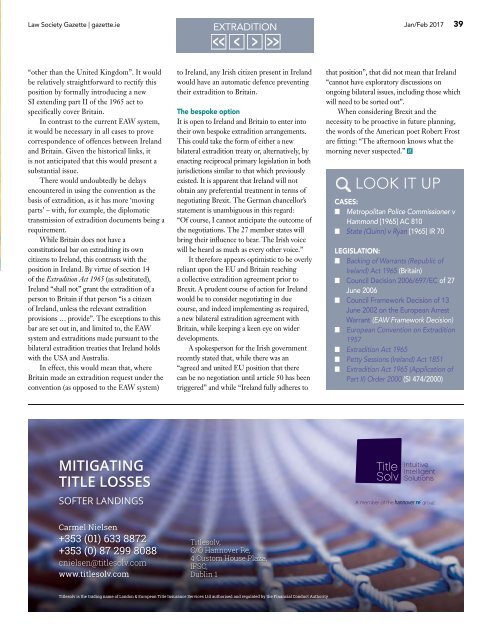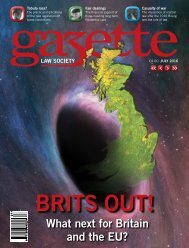ga ette
Jan-Feb-17-Gazette
Jan-Feb-17-Gazette
You also want an ePaper? Increase the reach of your titles
YUMPU automatically turns print PDFs into web optimized ePapers that Google loves.
Law Society Gaz<strong>ette</strong> | <strong>ga</strong>z<strong>ette</strong>.ie Jan/Feb 2017<br />
EXTRADITION<br />
39<br />
“other than the United Kingdom”. It would<br />
be relatively straightforward to rectify this<br />
position by formally introducing a new<br />
SI extending part II of the 1965 act to<br />
specifically cover Britain.<br />
In contrast to the current EAW system,<br />
it would be necessary in all cases to prove<br />
correspondence of offences between Ireland<br />
and Britain. Given the historical links, it<br />
is not anticipated that this would present a<br />
substantial issue.<br />
There would undoubtedly be delays<br />
encountered in using the convention as the<br />
basis of extradition, as it has more ‘moving<br />
parts’ – with, for example, the diplomatic<br />
transmission of extradition documents being a<br />
requirement.<br />
While Britain does not have a<br />
constitutional bar on extraditing its own<br />
citizens to Ireland, this contrasts with the<br />
position in Ireland. By virtue of section 14<br />
of the Extradition Act 1965 (as substituted),<br />
Ireland “shall not” grant the extradition of a<br />
person to Britain if that person “is a citizen<br />
of Ireland, unless the relevant extradition<br />
provisions … provide”. The exceptions to this<br />
bar are set out in, and limited to, the EAW<br />
system and extraditions made pursuant to the<br />
bilateral extradition treaties that Ireland holds<br />
with the USA and Australia.<br />
In effect, this would mean that, where<br />
Britain made an extradition request under the<br />
convention (as opposed to the EAW system)<br />
to Ireland, any Irish citizen present in Ireland<br />
would have an automatic defence preventing<br />
their extradition to Britain.<br />
The bespoke option<br />
It is open to Ireland and Britain to enter into<br />
their own bespoke extradition arrangements.<br />
This could take the form of either a new<br />
bilateral extradition treaty or, alternatively, by<br />
enacting reciprocal primary legislation in both<br />
jurisdictions similar to that which previously<br />
existed. It is apparent that Ireland will not<br />
obtain any preferential treatment in terms of<br />
negotiating Brexit. The German chancellor’s<br />
statement is unambiguous in this re<strong>ga</strong>rd:<br />
“Of course, I cannot anticipate the outcome of<br />
the negotiations. The 27 member states will<br />
bring their influence to bear. The Irish voice<br />
will be heard as much as every other voice.”<br />
It therefore appears optimistic to be overly<br />
reliant upon the EU and Britain reaching<br />
a collective extradition agreement prior to<br />
Brexit. A prudent course of action for Ireland<br />
would be to consider negotiating in due<br />
course, and indeed implementing as required,<br />
a new bilateral extradition agreement with<br />
Britain, while keeping a keen eye on wider<br />
developments.<br />
A spokesperson for the Irish government<br />
recently stated that, while there was an<br />
“agreed and united EU position that there<br />
can be no negotiation until article 50 has been<br />
triggered” and while “Ireland fully adheres to<br />
that position”, that did not mean that Ireland<br />
“cannot have exploratory discussions on<br />
ongoing bilateral issues, including those which<br />
will need to be sorted out”.<br />
When considering Brexit and the<br />
necessity to be proactive in future planning,<br />
the words of the American poet Robert Frost<br />
are fitting: “The afternoon knows what the<br />
morning never suspected.”<br />
LOOK IT UP<br />
CASES:<br />
n Metropolitan Police Commissioner v<br />
Hammond [1965] AC 810<br />
n State (Quinn) v Ryan [1965] IR 70<br />
LEGISLATION:<br />
n Backing of Warrants (Republic of<br />
Ireland) Act 1965 (Britain)<br />
n Council Decision 2006/697/EC of 27<br />
June 2006<br />
n Council Framework Decision of 13<br />
June 2002 on the European Arrest<br />
Warrant (EAW Framework Decision)<br />
n European Convention on Extradition<br />
1957<br />
n Extradition Act 1965<br />
n Petty Sessions (Ireland) Act 1851<br />
n Extradition Act 1965 (Application of<br />
Part II) Order 2000 (SI 474/2000)<br />
MITIGATING<br />
TITLE LOSSES<br />
SOFTER LANDINGS<br />
Carmel Nielsen<br />
+353 (01) 633 8872<br />
+353 (0) 87 299 8088<br />
cnielsen@titlesolv.com<br />
www.titlesolv.com<br />
Titlesolv,<br />
C/O Hannover Re,<br />
4 Custom House Plaza,<br />
IFSC,<br />
Dublin 1<br />
Titlesolv is the trading name of London & European Title Insurance Services Ltd authorised and regulated by the Financial Conduct Authority<br />
3284TLV_Miti<strong>ga</strong>ting_Title_Losses_187x90mm_Irish_Advert_V1_050516.indd 1 05/05/2016 11:09



